人教新目标(Go for it)版英语七年级下册 Review of Unit 2 What time do you go to school?课件(共47张PPT)
文档属性
| 名称 | 人教新目标(Go for it)版英语七年级下册 Review of Unit 2 What time do you go to school?课件(共47张PPT) |

|
|
| 格式 | ppt | ||
| 文件大小 | 2.9MB | ||
| 资源类型 | 教案 | ||
| 版本资源 | 人教新目标(Go for it)版 | ||
| 科目 | 英语 | ||
| 更新时间 | 2022-06-10 00:00:00 | ||
图片预览


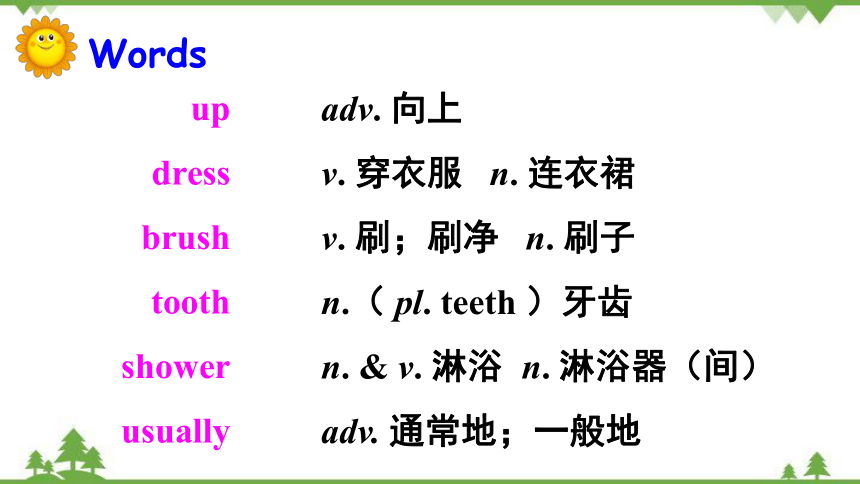
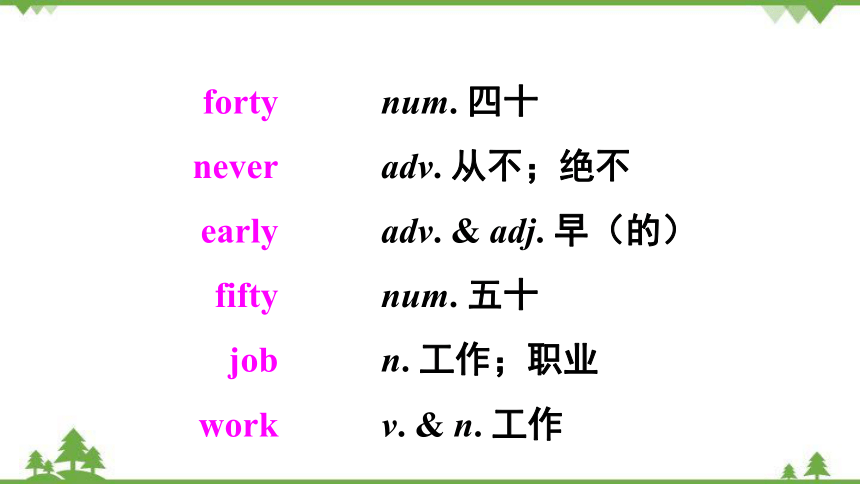
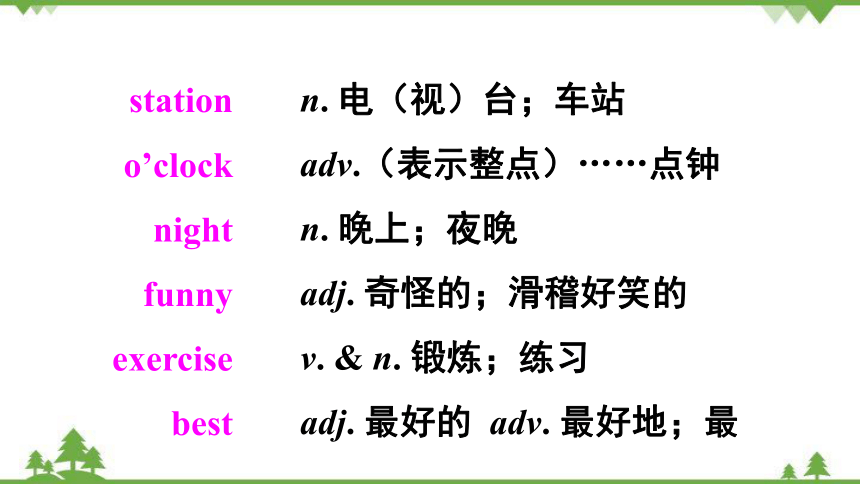
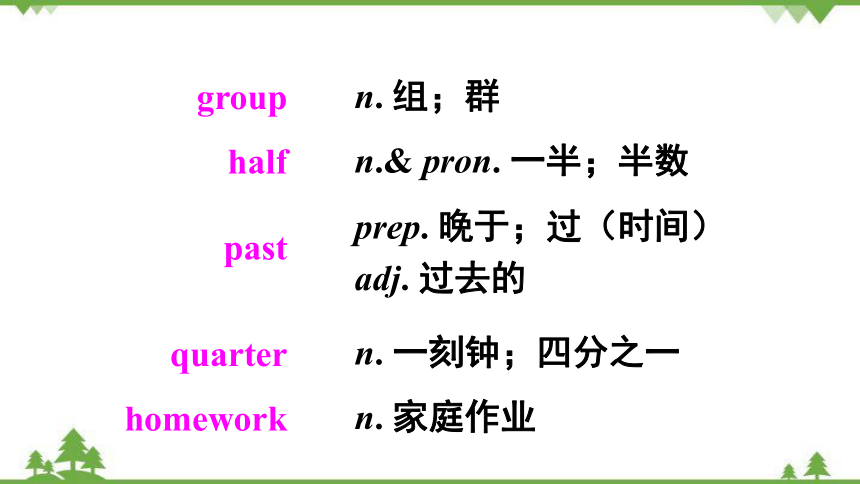
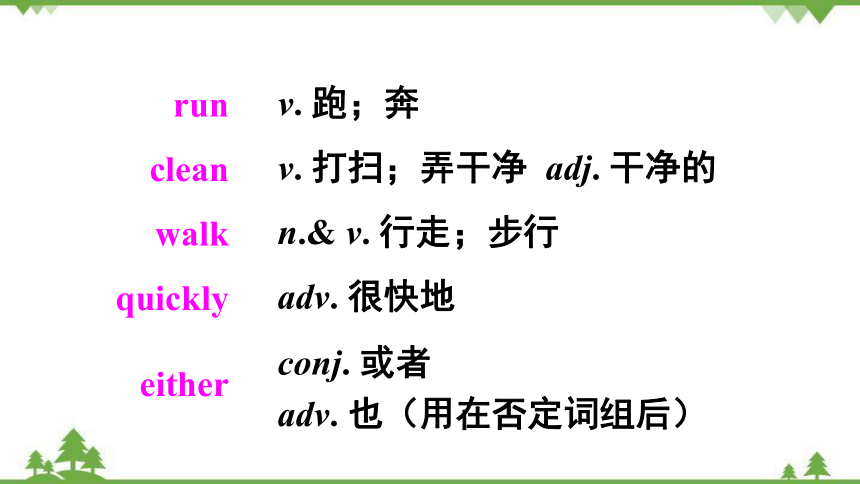
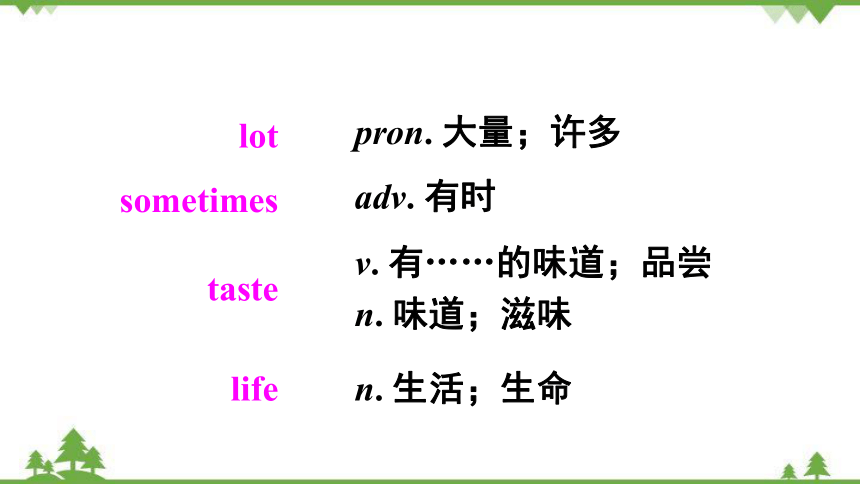
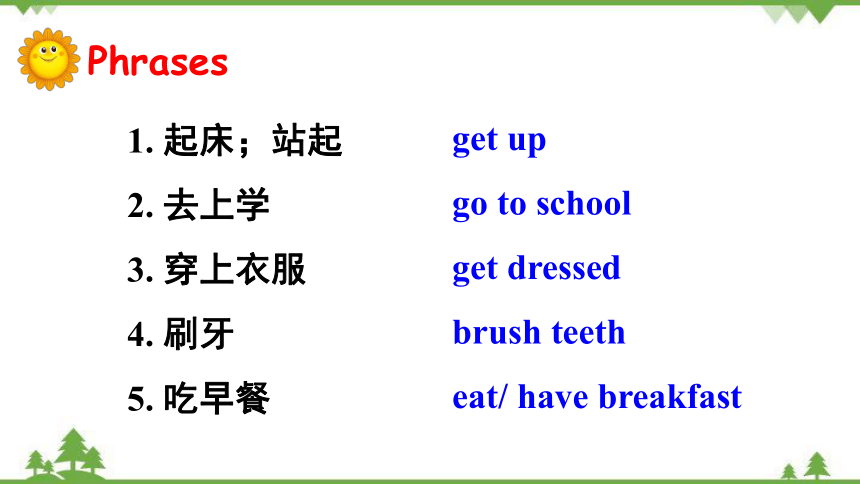
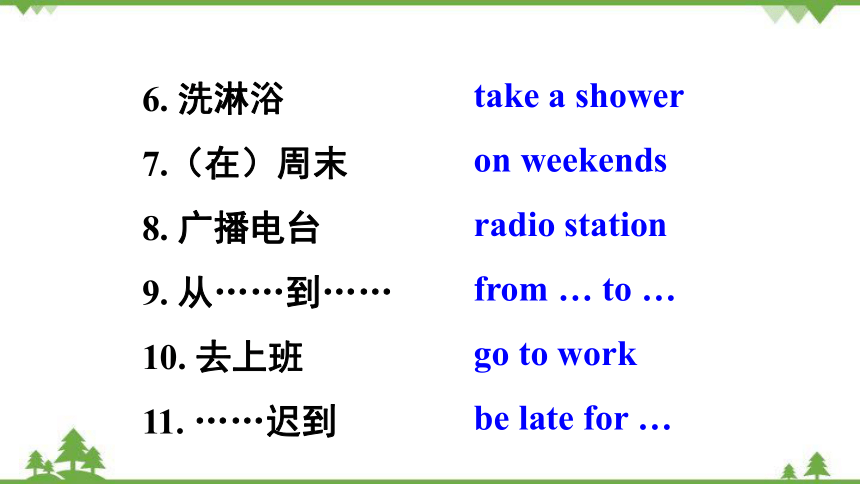
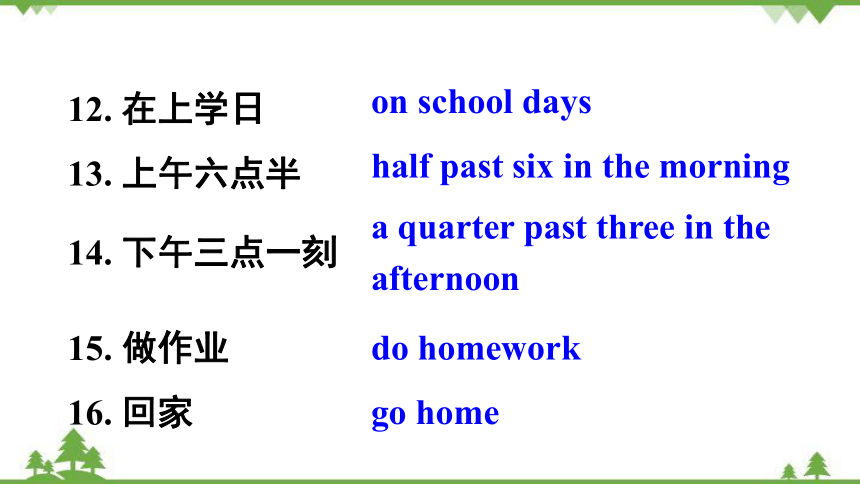
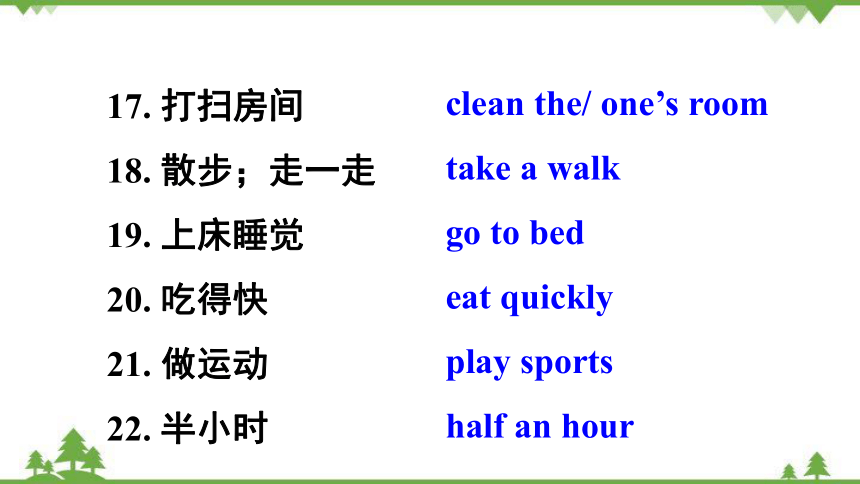
文档简介
(共47张PPT)
Review of Unit 2
单词
短语
adv. 向上
v. 穿衣服 n. 连衣裙
v. 刷;刷净 n. 刷子
n.( pl. teeth )牙齿
n. & v. 淋浴 n. 淋浴器(间)
adv. 通常地;一般地
up
dress
brush
tooth
shower
usually
Words
num. 四十
adv. 从不;绝不
adv. & adj. 早(的)
num. 五十
n. 工作;职业
v. & n. 工作
forty
never
early
fifty
job
work
n. 电(视)台;车站
adv.(表示整点)……点钟
n. 晚上;夜晚
adj. 奇怪的;滑稽好笑的
v. & n. 锻炼;练习
adj. 最好的 adv. 最好地;最
station
o’clock
night
funny
exercise
best
n. 组;群
n.& pron. 一半;半数
prep. 晚于;过(时间)
adj. 过去的
n. 一刻钟;四分之一
n. 家庭作业
group
half
past
quarter
homework
v. 跑;奔
v. 打扫;弄干净 adj. 干净的
n.& v. 行走;步行
adv. 很快地
conj. 或者
adv. 也(用在否定词组后)
run
clean
walk
quickly
either
pron. 大量;许多
adv. 有时
v. 有……的味道;品尝
n. 味道;滋味
n. 生活;生命
lot
sometimes
taste
life
get up
go to school
get dressed
brush teeth
eat/ have breakfast
1. 起床;站起
2. 去上学
3. 穿上衣服
4. 刷牙
5. 吃早餐
Phrases
take a shower
on weekends
radio station
from … to …
go to work
be late for …
6. 洗淋浴
7.(在)周末
8. 广播电台
9. 从……到……
10. 去上班
11. ……迟到
on school days
half past six in the morning
a quarter past three in the
afternoon
do homework
go home
12. 在上学日
13. 上午六点半
14. 下午三点一刻
15. 做作业
16. 回家
clean the/ one’s room
take a walk
go to bed
eat quickly
play sports
half an hour
17. 打扫房间
18. 散步;走一走
19. 上床睡觉
20. 吃得快
21. 做运动
22. 半小时
get home
either … or …
lots of
be good for …
23. 到家
24. 要么……要么……;
或者……或者……
25. 大量;许多
26. 对……有好处
1. Frank likes sports, but he _______ (从不) plays
them.
2. Mr. Green is very healthy because he ________
(锻炼) every day.
一、根据句意及汉语提示填写单词。
never
exercises
即时演练
3. I want to find a good _____ (工作) in Shanghai.
4. Twenty and thirty is _______ (五十).
5. Let’s meet at the train ______ (车站) tomorrow
morning.
6. Many students do their _________ (作业) on the
computer.
job
fifty
station
homework
7. __________ (有时) I go to the old people’s home
with my classmates.
8. I _____ (或者) play volleyball or play basketball
after school.
9. It _______ (尝起来) delicious.
10. —Do you have a good ______ (生活)
—Yes, we do.
Sometimes
either
tastes
life
二、单项选择。
1. Lucy has an interesting _____. She _____ at a
TV station.
A. work; works B. work; job
C. job; job D. job; works
2. Mike never _____ breakfast in the morning.
A. eats B. eat C. take D. takes
3. Kate _____ her room every day, so her room is
very _____.
A. clean; clean B. cleans; cleans
C. clean; cleans D. cleans; clean
4. Wu Fang likes _____ a walk after dinner every
day.
A. going B. go C. taking D. take
1. I usually _____ __ ______ (淋浴) in the evening.
2. Do you watch TV ____ ______ (晚上)
3. Can you _____ ________ (穿衣服)
4. My father works at a _____ _______ (广播电台).
5. What time do you usually ____ ___ (起床) every
day
三、根据汉语意思提示完成句子,每空一词。
take a shower
at night
get dressed
radio station
get up
1. 他们周末不上学。
They don’t go to school _____ _________.
2. 我们从周一到周五上学。
We go to school _____ Monday ____ Friday.
四、根据汉语意思完成句子,每空一词。
on weekends
from
to
3. 我穿好衣服后就吃饭。
After I _____ ________, I have breakfast.
4. 她上课总是迟到。
She _____ always _____ _____ class.
5. 弗兰克通常何时锻炼?
______ does Frank ________ _________
get dressed
is
late for
When
usually exercise
重点
语法
时间的询问方式与表达时间的介词
时间的询问方式
(1)when 和 what time 都可以用来询问时间,
意为“什么时候;何时”。
当询问事件发生的具体时间时,用when
和what time均可以。
一、
翻译:——你什么时候穿上衣服?
——我上午七点穿衣服。
—What time/ When do you get dressed
—I get dressed at 7: 00 a.m.
(2)当询问时间发生的年份、月份、具体日期时,
只能用when来提问。
翻译:——露西爸爸的生日是什么时候?
——是1月1日。
—When is Lucy’s father’s birthday
—It’s on January 1st.
表达时间的介词
表示“在某一时刻,某一时点”,后面常常接具体时刻。如: at 6:25 在6点25分
介词短语:at noon 在中午
at night 在夜间
at
表示泛指的上午、下午或晚上,或“在某世纪、年、季度、月、周”。
如:在上午/ 下午/ 晚上
in the morning/ afternoon/ evening
在20世纪
在1999年
在九月
in
in the 20th century
in 1999
在冬季
in winter
in September
表示“在具体某一天”,后接特定日期,或者特定日期/ 情景的早上、下午或晚上。
如:在星期天
在3月8号
在一个下雨的早晨
on
on Sunday
on March 8
on a rainy morning
常用于时刻前或年龄前,也可用在一些固定短语前。
如:在8点
在4岁的时候
在夜晚
at
at eight o’clock
at the age of four
at night
从(某个时间点)开始
如:从星期一到星期五
from Monday to Friday
from
频度副词
二、
always
usually
often
sometimes
never
100%
70%~80%
60%~70%
30%~40%
0%
频度副词一般放在系动词be、助动词、情态动词之后,实义动词之前。
但sometimes的位置比较灵活,可置于句首、句中或句末。
常和一般现在时连用,表示现在经常或反复发生的动作。
位置
翻译:我经常锻炼。
I often exercise.
吉姆有时候在午餐后弹钢琴。
Sometimes Jim plays the piano after lunch.
一、单项选择。
1. It’s good for us to drink milk ______ the
morning.
A. at B. on C. in D. from
2. Helen usually goes to bed ______ nine o’clock.
A. in B. at C. on D. from
即时演练
3. —When can we go to Wuhan
—______ May 14th.
A. From B. In C. At D. On
4. Nancy is a good student. She ______ gets to
school on time.
A. sometimes B. never C. always D. usually
5. Scott is a teacher. He ______ in a middle school.
A. works B. work
C. working D. to work
6. ______ do you get dressed —At 7:30.
A. What time B. How did
C. How long D. How much
1. 你父母通常几点去上班?
_____ _____ do your parents _______ go to work
2. 他们上学从不迟到。
They _____ ______ _____ _____ school.
3. 我们经常在晚上八点看电视。
We often watch TV _____ ______ at night.
二、根据汉语意思完成句子,每空一词。
What time
usually
are never late for
at eight
4. 大卫每天洗淋浴。
David ______ ____ _______ every day.
5. ——你们何时举行音乐节?
——在9月5号。
— _______ will you have the music festival
— _____ September 5th.
takes a shower
When
On
当堂
训练
1. Don’t eat too ______. It’s not good ______ your
health.
A. quick; to B. quickly; for
C. quickly; to D. quick; for
2. Tony usually eats breakfast ______ 6:30 ______
the morning.
A. at; at B. in; at C. at; in D. in; in
一、单项选择。
3. I have ______ time ______ breakfast.
A. much; with B. lot; for
C. lots of; for D. a lot; for
4. —Can Jack sing English songs
—No, he can’t. And I can’t, _______.
A. either B. also C. too
1. 你通常什么时候睡觉
______ ______ do you usually go to bed
2. 他朋友经常在早上淋浴。
His friend often ____ ___ ______ in the morning.
3. 他们通常在周末锻炼。
They usually _________ ___ ___________.
二、根据汉语意思完成句子。
What time
takes a shower
exercise on weekends
4. 迈克有时候在晚上九点半吃晚饭。
Mike __________ _________ ________ at _____
past nine at night.
5. 每周末我都和妈妈出去吃饭。
I ______ _____ for a meal with my mother every
weekend.
sometimes has/eats dinner
half
go out
三、选择适当的选项补全对话。
A. I usually go out to run with my father.
B. What time do you eat breakfast
C. Then I go to school.
D. What time do you usually get up in the
morning
E. What do you usually do after breakfast
Sonia: Hi, Han Li! You are so early!
Han Li: Yes. I usually get to school at 7:30.
Sonia: 1. ______
Han Li: I usually get up at six fifteen.
Sonia: What do you usually do after you get up
D
Han Li: 2. ______
Sonia: 3. ______
Han Li: Usually at 6:40.
Sonia: 4. ______
Han Li: I usually play the guitar. 5. ______
Sonia: What a busy morning!
A
B
E
C
Congratulations!
Review of Unit 2
单词
短语
adv. 向上
v. 穿衣服 n. 连衣裙
v. 刷;刷净 n. 刷子
n.( pl. teeth )牙齿
n. & v. 淋浴 n. 淋浴器(间)
adv. 通常地;一般地
up
dress
brush
tooth
shower
usually
Words
num. 四十
adv. 从不;绝不
adv. & adj. 早(的)
num. 五十
n. 工作;职业
v. & n. 工作
forty
never
early
fifty
job
work
n. 电(视)台;车站
adv.(表示整点)……点钟
n. 晚上;夜晚
adj. 奇怪的;滑稽好笑的
v. & n. 锻炼;练习
adj. 最好的 adv. 最好地;最
station
o’clock
night
funny
exercise
best
n. 组;群
n.& pron. 一半;半数
prep. 晚于;过(时间)
adj. 过去的
n. 一刻钟;四分之一
n. 家庭作业
group
half
past
quarter
homework
v. 跑;奔
v. 打扫;弄干净 adj. 干净的
n.& v. 行走;步行
adv. 很快地
conj. 或者
adv. 也(用在否定词组后)
run
clean
walk
quickly
either
pron. 大量;许多
adv. 有时
v. 有……的味道;品尝
n. 味道;滋味
n. 生活;生命
lot
sometimes
taste
life
get up
go to school
get dressed
brush teeth
eat/ have breakfast
1. 起床;站起
2. 去上学
3. 穿上衣服
4. 刷牙
5. 吃早餐
Phrases
take a shower
on weekends
radio station
from … to …
go to work
be late for …
6. 洗淋浴
7.(在)周末
8. 广播电台
9. 从……到……
10. 去上班
11. ……迟到
on school days
half past six in the morning
a quarter past three in the
afternoon
do homework
go home
12. 在上学日
13. 上午六点半
14. 下午三点一刻
15. 做作业
16. 回家
clean the/ one’s room
take a walk
go to bed
eat quickly
play sports
half an hour
17. 打扫房间
18. 散步;走一走
19. 上床睡觉
20. 吃得快
21. 做运动
22. 半小时
get home
either … or …
lots of
be good for …
23. 到家
24. 要么……要么……;
或者……或者……
25. 大量;许多
26. 对……有好处
1. Frank likes sports, but he _______ (从不) plays
them.
2. Mr. Green is very healthy because he ________
(锻炼) every day.
一、根据句意及汉语提示填写单词。
never
exercises
即时演练
3. I want to find a good _____ (工作) in Shanghai.
4. Twenty and thirty is _______ (五十).
5. Let’s meet at the train ______ (车站) tomorrow
morning.
6. Many students do their _________ (作业) on the
computer.
job
fifty
station
homework
7. __________ (有时) I go to the old people’s home
with my classmates.
8. I _____ (或者) play volleyball or play basketball
after school.
9. It _______ (尝起来) delicious.
10. —Do you have a good ______ (生活)
—Yes, we do.
Sometimes
either
tastes
life
二、单项选择。
1. Lucy has an interesting _____. She _____ at a
TV station.
A. work; works B. work; job
C. job; job D. job; works
2. Mike never _____ breakfast in the morning.
A. eats B. eat C. take D. takes
3. Kate _____ her room every day, so her room is
very _____.
A. clean; clean B. cleans; cleans
C. clean; cleans D. cleans; clean
4. Wu Fang likes _____ a walk after dinner every
day.
A. going B. go C. taking D. take
1. I usually _____ __ ______ (淋浴) in the evening.
2. Do you watch TV ____ ______ (晚上)
3. Can you _____ ________ (穿衣服)
4. My father works at a _____ _______ (广播电台).
5. What time do you usually ____ ___ (起床) every
day
三、根据汉语意思提示完成句子,每空一词。
take a shower
at night
get dressed
radio station
get up
1. 他们周末不上学。
They don’t go to school _____ _________.
2. 我们从周一到周五上学。
We go to school _____ Monday ____ Friday.
四、根据汉语意思完成句子,每空一词。
on weekends
from
to
3. 我穿好衣服后就吃饭。
After I _____ ________, I have breakfast.
4. 她上课总是迟到。
She _____ always _____ _____ class.
5. 弗兰克通常何时锻炼?
______ does Frank ________ _________
get dressed
is
late for
When
usually exercise
重点
语法
时间的询问方式与表达时间的介词
时间的询问方式
(1)when 和 what time 都可以用来询问时间,
意为“什么时候;何时”。
当询问事件发生的具体时间时,用when
和what time均可以。
一、
翻译:——你什么时候穿上衣服?
——我上午七点穿衣服。
—What time/ When do you get dressed
—I get dressed at 7: 00 a.m.
(2)当询问时间发生的年份、月份、具体日期时,
只能用when来提问。
翻译:——露西爸爸的生日是什么时候?
——是1月1日。
—When is Lucy’s father’s birthday
—It’s on January 1st.
表达时间的介词
表示“在某一时刻,某一时点”,后面常常接具体时刻。如: at 6:25 在6点25分
介词短语:at noon 在中午
at night 在夜间
at
表示泛指的上午、下午或晚上,或“在某世纪、年、季度、月、周”。
如:在上午/ 下午/ 晚上
in the morning/ afternoon/ evening
在20世纪
在1999年
在九月
in
in the 20th century
in 1999
在冬季
in winter
in September
表示“在具体某一天”,后接特定日期,或者特定日期/ 情景的早上、下午或晚上。
如:在星期天
在3月8号
在一个下雨的早晨
on
on Sunday
on March 8
on a rainy morning
常用于时刻前或年龄前,也可用在一些固定短语前。
如:在8点
在4岁的时候
在夜晚
at
at eight o’clock
at the age of four
at night
从(某个时间点)开始
如:从星期一到星期五
from Monday to Friday
from
频度副词
二、
always
usually
often
sometimes
never
100%
70%~80%
60%~70%
30%~40%
0%
频度副词一般放在系动词be、助动词、情态动词之后,实义动词之前。
但sometimes的位置比较灵活,可置于句首、句中或句末。
常和一般现在时连用,表示现在经常或反复发生的动作。
位置
翻译:我经常锻炼。
I often exercise.
吉姆有时候在午餐后弹钢琴。
Sometimes Jim plays the piano after lunch.
一、单项选择。
1. It’s good for us to drink milk ______ the
morning.
A. at B. on C. in D. from
2. Helen usually goes to bed ______ nine o’clock.
A. in B. at C. on D. from
即时演练
3. —When can we go to Wuhan
—______ May 14th.
A. From B. In C. At D. On
4. Nancy is a good student. She ______ gets to
school on time.
A. sometimes B. never C. always D. usually
5. Scott is a teacher. He ______ in a middle school.
A. works B. work
C. working D. to work
6. ______ do you get dressed —At 7:30.
A. What time B. How did
C. How long D. How much
1. 你父母通常几点去上班?
_____ _____ do your parents _______ go to work
2. 他们上学从不迟到。
They _____ ______ _____ _____ school.
3. 我们经常在晚上八点看电视。
We often watch TV _____ ______ at night.
二、根据汉语意思完成句子,每空一词。
What time
usually
are never late for
at eight
4. 大卫每天洗淋浴。
David ______ ____ _______ every day.
5. ——你们何时举行音乐节?
——在9月5号。
— _______ will you have the music festival
— _____ September 5th.
takes a shower
When
On
当堂
训练
1. Don’t eat too ______. It’s not good ______ your
health.
A. quick; to B. quickly; for
C. quickly; to D. quick; for
2. Tony usually eats breakfast ______ 6:30 ______
the morning.
A. at; at B. in; at C. at; in D. in; in
一、单项选择。
3. I have ______ time ______ breakfast.
A. much; with B. lot; for
C. lots of; for D. a lot; for
4. —Can Jack sing English songs
—No, he can’t. And I can’t, _______.
A. either B. also C. too
1. 你通常什么时候睡觉
______ ______ do you usually go to bed
2. 他朋友经常在早上淋浴。
His friend often ____ ___ ______ in the morning.
3. 他们通常在周末锻炼。
They usually _________ ___ ___________.
二、根据汉语意思完成句子。
What time
takes a shower
exercise on weekends
4. 迈克有时候在晚上九点半吃晚饭。
Mike __________ _________ ________ at _____
past nine at night.
5. 每周末我都和妈妈出去吃饭。
I ______ _____ for a meal with my mother every
weekend.
sometimes has/eats dinner
half
go out
三、选择适当的选项补全对话。
A. I usually go out to run with my father.
B. What time do you eat breakfast
C. Then I go to school.
D. What time do you usually get up in the
morning
E. What do you usually do after breakfast
Sonia: Hi, Han Li! You are so early!
Han Li: Yes. I usually get to school at 7:30.
Sonia: 1. ______
Han Li: I usually get up at six fifteen.
Sonia: What do you usually do after you get up
D
Han Li: 2. ______
Sonia: 3. ______
Han Li: Usually at 6:40.
Sonia: 4. ______
Han Li: I usually play the guitar. 5. ______
Sonia: What a busy morning!
A
B
E
C
Congratulations!
同课章节目录
- Unit 1 Can you play the guitar?
- Section A
- Section B
- Unit 2 What time do you go to school?
- Section A
- Section B
- Unit 3 How do you get to school?
- Section A
- Section B
- Unit 4 Don't eat in class.
- Section A
- Section B
- Unit 5 Why do you like pandas?
- Section A
- Section B
- Unit 6 I'm watching TV.
- Section A
- Section B
- Review of Units 1-6
- Unit 7 It's raining!
- Section A
- Section B
- Unit 8 Is there a post office near here?
- Section A
- Section B
- Unit 9 What does he look like?
- Section A
- Section B
- Unit 10 I'd like some noodles.
- Section A
- Section B
- Unit 11 How was your school trip?
- Section A
- Section B
- Unit 12 What did you do last weekend?
- Section A
- Section B
